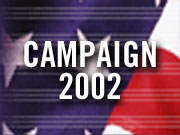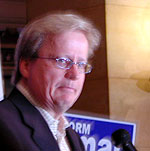What happened?
November 6, 2002
Minnesota Republicans are ecstatic, and Democrats are reeling from the near-Republican sweep of the general election. Republicans won races for U.S. Senate, governor, two closely-watched suburban congressional seats, and all but one constitutional office. Political observers say the reasons range from the messages of the campaigns to reaction to last week's memorial service for the late Sen. Paul Wellstone.
St. Paul, Minn. — Four years ago, when Jesse Ventura "shocked the world" with his surprise victory, many political observers were scratching their heads over what happened. There's a good deal of that going on this year as well. Republicans are celebrating Sen.-elect Norm Coleman, Gov.-elect Tim Pawlenty, and victories on down the ticket.
| |
|
|
|
||
Pawlenty says the political pendulum swung toward the Republicans this year, and he thinks it's because of the problems facing the country.
"I think people recognize we're in tough times; we've got war, and we've got recession, we've got budget deficits, we have thousands of Minnesotans losing their jobs, and so it requires a different style of leadership, and I think the message that we tried to convey in this race I think was well-received," he said.
During the campaign, Pawlenty constantly stressed that he was the only candidate who had pledged not to raise taxes to balance the budget. Coleman also stressed economic issues, including job growth and permanent tax cuts.
Both candidates also talked about security issues surrounding the war on terrorism. Political scientist Chris Gilbert of Gustavus Adolphus College in St. Peter says Democrats are the state and national levels have struggled to articulate what they stand for.
"And the general impressions presented in this race, outside of Paul Wellstone, until he died, was that somehow, the DFL Party stands for things in the past or perhaps doesn't stand for anything specific at all," he said.
DFL state party chair Mike Erlandson admits Democrats failed to persuade voters with their message. He says the DFL issues of education and transportation are more difficult to convey in a sound bite than a no-tax-increase pledge.
"It's always easier to find a reason to be against something than it is to find a reason to be for something, and I think that probably makes it more difficult for Democrats to articulate their messages because we really are trying to make government work for people," Erlandson says.
Erlandson says Republicans also got a boost from the numerous Minnesota visits by President Bush and other White House representatives. Some political observers think the partisan tone of last week's memorial service-turned-political rally for Wellstone may have backfired and hurt Democrats.
Republican Party officials say the event certainly energized their base, and may have swayed some undecided voters in their direction. Coleman's campaign manager, Ben Whitney, says interest in the campaign definitely increased after the memorial service. But Whitney thinks the bigger reason was the way Coleman showed a more emotional side of himself by publicly grieving Wellstone's death.
"It was a factor, but I don't think - had Norm not handled it in the way he did - I don't think it would have been the factor. Sure, there were angry people and it motivated some people. But you can't capture that unless they can find a way to connect to what you're trying to do," says Whitney.
Republican Party officials say the party also spent a lot of money and energy on get-out-the-vote efforts this year. Party chair Ron Eibensteiner says the party benefited from having two charismatic candidates at the top of the ticket - Coleman and Pawlenty - who helped Republicans further down the ballot.
Both Coleman and Pawlenty said the election was about the past versus the future - and both were running against DFL opponents about 20 years older than them.
DFL chair Erlandson says the age difference may have hurt Democrats, although he argues that voters should hire the most qualified person for the job.
"The reality is, it's about experience and it's about leadership, and again, it's more difficult to articulate that message and to talk about those things than it is simply to say, 'Hey, I'm younger, I'm about the future, they're about the past,'" according to Eibensteiner.
Erlandson says while Democrats are discouraged, they'll regroup and return for another fight.
|
News Headlines
|
Related Subjects
|


